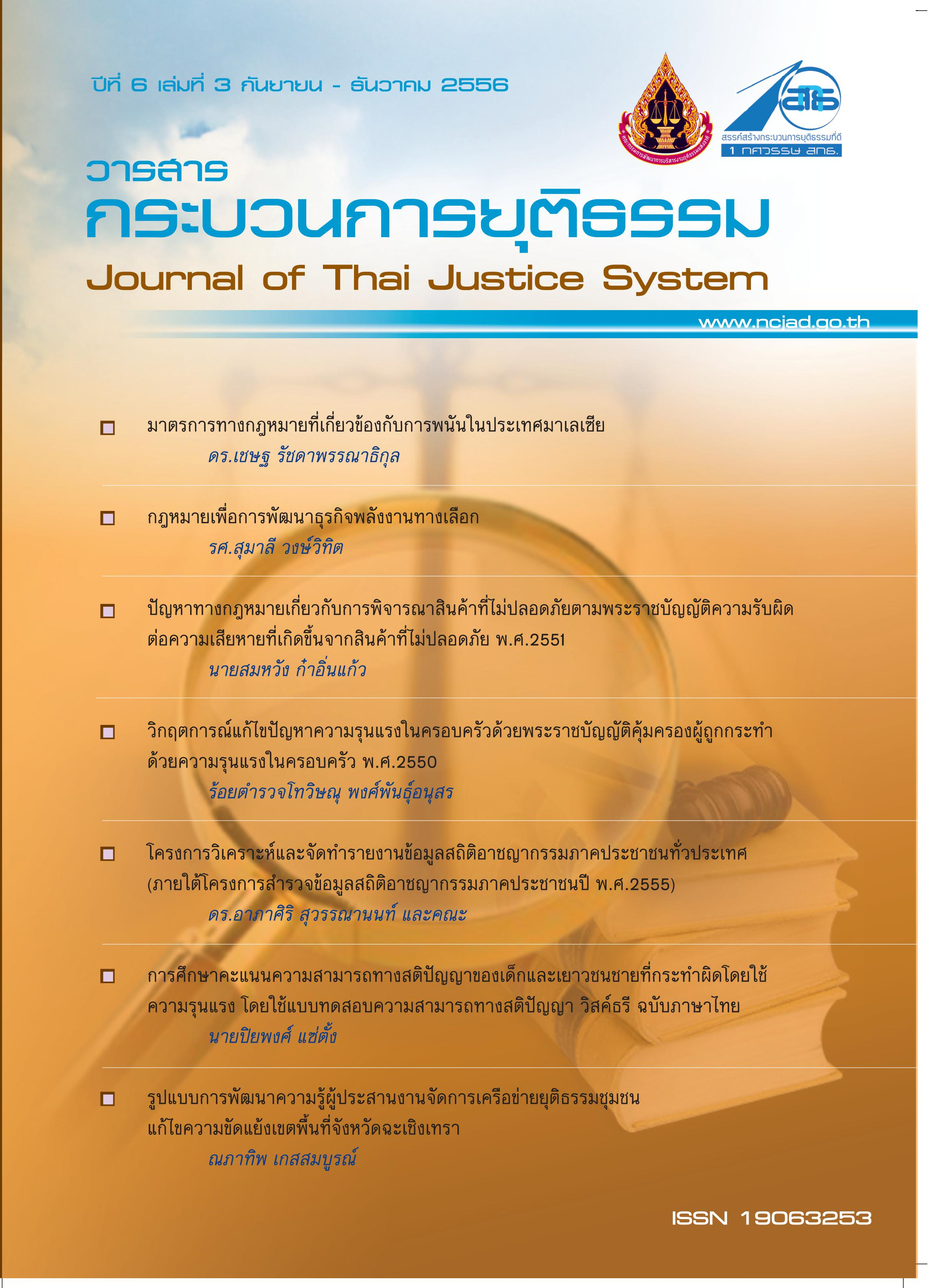กฎหมายเพื่อการพัฒนาธุรกิจพลังงานทางเลือก
Main Article Content
บทคัดย่อ
วัตถุประสงค์ของงามวิจัยนี้คือ เพื่อศึกษากฎหมาย มโนบายและการนำนโยบายไปปฏิบัติ (ทั้งของไทยและการนำนโยบายไปปฏิบัติ (ทั้งของไทยและต่างประเทศ) เกี่ยวกับธุรกิจพลังงานทางเลือก เพื่อหาปัจจัยอันเป็นการส่งเสริมหรือเป็นอุปสรรคต่อการพัฒนาธุรกิจพลังงานทางเลือก และเพื่อหาข้อเสนอแนะมาตราการทางกฎหมายและการบังคับใช้กฎหมายที่เหมาะสมเพียงพอต่อการต่อการพัฒนาธุรกิจพัลงานทางเลือกของไทย โดยใช้การวิจัยเชิงคุณภาพ ซึ่งใช้เทคนิคการรวมรวมและวิเคราะห์ขุอมูล คือการวิจัยเอกสารและการสัมภาษณ์อย่างเจาะลึก เน้นการวิเคราะห์กฎหมยา (legal analysis) เป็นหลัก ผลการศึกษาพบว่านโยบายรัฐและการนำนโยบายไปปฏิบัติยังมีปัญหาบางประการ เช่น ไม่ครอบคลุม ไม่ชัดเจน ขาดทิศทางที่ชัดเจน ไม่ทันสมัย ไม่สร้างความมั่นใจให้แก่นังลงทุนอย่างเพียงพอ โดยเฉพาะการขาดโครงการสร้างองค์กรกำกับดูแลและส่งเสริมกิจการพลังงานทางเลือก และการมีกฎหมายเป็นจำนวนมากซึ่งซ้ำซ้อน ไม่ครอบคลุมไม่ชัดเจน จึงเสนอแนะให้ปรับปรุงโครงสร้างองค์กรกำกับดูแลและส่งเสริมกิจการพลังงานเป็นองค์รวม ไม่แยกส่วน และบูรณาการกฎหมายให้เป็นเอกภาพต้องลดการอุดหนุนเชื้อเพลิงจากพลังงานกระแสหลัก และลดการผูกขาดกิจการพลังงานโดยรัฐวิสาหกิจด้วย และกฎหมายต้องมีสาระสำคัญเรื่องการจัดตั้งองค์กรกำกับดูแลที่เป็นอิสระ การกำกับกิจการพลังงานทางเลือกข้อกำหนดที่มีเกณฑ์ที่ชัดเจนในการใช้ดุลพินิจและการบังคับใช้กฎหมายการออกฎหมายพิเศษเฉพาะสำหรับการพัฒนาและส่งเสริมเอทานอลและไบโอดีเซล และการกำหนดมาตราการส่งเสริมและการสร้างเครื่องมือในการจูงใจ ซึ่งต้องมีการตรวจสอบถึงความเป็นกฎหมายที่ดีกว่า (Better law) ภายใต้การมีส่วนร่วมและการยอมรับของทุกฝ่าย โดยมีเป้าคือการใช้กฎหมายเป็นเครื่องมือให้มีการพัฒนาธุรกิจพลังงานทางเลือก
Article Details
ต้นฉบับที่ได้รับการตีพิมพ์ในวารสาร เป็นลิขสิทธิ์ของวารสารกระบวนการยุติธรรม แต่ความคิดเห็นที่ปรากฏในเนื้อหาของบทความในวารสารกระบวนการยุติธรรม ถือเป็นความรับผิดชอบของผู้เขียนแต่เพียงผู้เดียว
เอกสารอ้างอิง
ณัฐชมัย ลักษณ์อำนวยพร. (2549). พลังงานทดแทน. กรุงเทพฯ:มหาวิทยาลัยเทคโนโลยีราชมงพระนคร วิทยาเขตพระนครเหนือ.
เดชรัต สุขกำเนิด. (2551). พลังงาน งานที่พลัง. กรุงเทพฯ: มูลนิธิโลกสีเขียว.
บริษัท เอเบิล คอนซัลแตนท์ จำกัด. (2551). รายงานฉบับสมบูรณ์โครงการติดตามประเมินผลการดำเนินงานพัมนาและส่งเสริมพลังงานลม. เสนอต่อกรรมพัฒนาพลังงานทดแทนและอนุรักษ์พลังงาน.
ประจักษ์ ทรัพย์มณี. (2547). ความขัดแย้งของผลประโยชน์ในการจัดสรรทรัพยากรเพื่อการผลิตไฟฟ้าในประเทศไทย. วารสารบัณฑิตพัมนบริหารศาสตร์ ฉบับพิเศษ"นวัตกรรมด้านการบริหาร การจัดการ และการพัฒนา, กุมภาพันธ์, หน้า 65-84.
มหาวิทยาลัยเทคโนโลยีพระจอมเกล้าธนบุรี. (2551). รายงานฉบับสมบูรณ์โครงการศึกษาประเมินศักยภาพพลังงานลมในการผลิตไฟฟ้าเฉพาะแหล่ง. เสนอต่อกรมพัฒนาพลังงานทดแทนและอนุรักษ์พลังงาน. กรุงเทพมหานคร: มหาวิทยาเทคโนโลยีพระจอมเกล้าธนบุรี.
วีรชัย อาจหาญ และคณะ. มหาวิทยาลัยเทคโนโลยีสุรนารี. (2554). ศึกษาสังเคราะห์ผลงานวิจัยที่เกี่ยวกับพลังงานทางเลือกในประเทศ. ทุนอุดหนุนการวิจัยของสำนักงาน คณะกรรมการวิจัยแห่งชาติ (วช.). กรุงเทพมหานคร: มหาวิทยาลัยเทคโนโลยีสุรนารี.
สมบัติ ทีฑทรัพย์. (2553) พลังงานทางเลือกของคนเมืองในยุควิกฤตพลังงาน. วารสารนโยบายพลังงาน, 88 เมษายน-มิถุนายน, หน้า 42-58
สุรพล นิติไกรพจน์. (2535). ข้อความคิดเบื้องต้นเกี่ยวกับมหาชนทางเศรษฐกิจ. วารสารนิติศาสตร์ ปีที่ 21 ฉบับที่ 1 (กันยายน 2535), หน้า 76-92.
Alturki. Y., Khelifa. N., and El-Kady.M. (2013) Promoting Alternative Energy Programs in Developed Countries: A Review, Energy and Power Enginieering, 5, 140-152. Retrieved December 5, 2013 from www.scirp.org/journal/PaperDownload.aspx?DOI=10.4236/epe.2013.
Energy saving. (2555). ทิศทางธุรกิจพลังงานทดแทน พ.ศ. 2555. ค้นเมื่อ 25 มกราคม 2555 จาก http://www.energysavingmedia.com/news/pagephp?a=10&n=106&cno=3058
KPMG International Cooperative. (2012). Taxes and incentives for revewable energy. Retrieved December 5, 2.12 from http://www.kpmg.com
Masmanian, D.A. and Sabatier, P.A. (1983). Implementation and Public Policy. USA. Scott: Foresman and Company.
Perkowski., Jack. (2012). China Leads The World In Renewable Energy Investment. Forbes. Retrieved Decemer 15, 2012 from http://www.forbes.com/sites/jackperkowski/2012/07/27/2012.
REN 21. (2012). Renewable 2012 Global Status Report Paris:REN 21 Secretariats.
REN 21 (Renwable Energy Policy Network for the 21st Century) Renewables (2012). Global Status Report Key Findings. Retrieved December 25, 2012 form http://www.ren21.net
_________. (2013). Renewables Global Futures Report 2013 Retrieved December 25, 2012 from http://www.ren21.net/Portals/0/REN21_GFR_2013_prind.pdf
Schuman. S., (2010). Improving China's Existing Renewable Energy Legal Framework: Lessongs from the International and Domestic Experience. NRDC White Paper.
United States Environmental Protection Agency. (2013). National Action Plan for Energy Efficiency.
U.S. Energy Information Administration. (2013). Annual Energy Outlook 2013 (AOE2013). Retrieved June 25, 2013 from www.eia.goc/forecasts/aeo.
Van Meter, D.S. and Van Horn. C.E. (1975). The Policy Implementation Process: A Conceptual Framework. Administration and Society. 6 (4) February, 445-488.
Volkmar L., Lutz M. (2004). Three Decades of Renewable Electricity Policies in Germany. Energy & Environment, 15 (4): 214 - 282.


